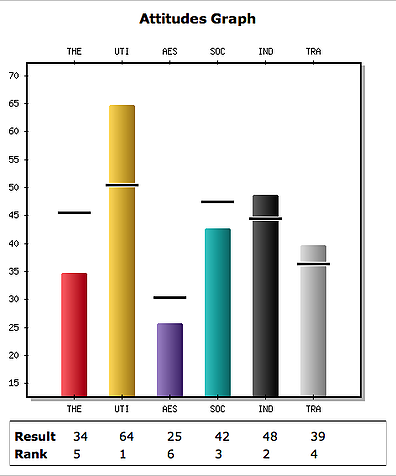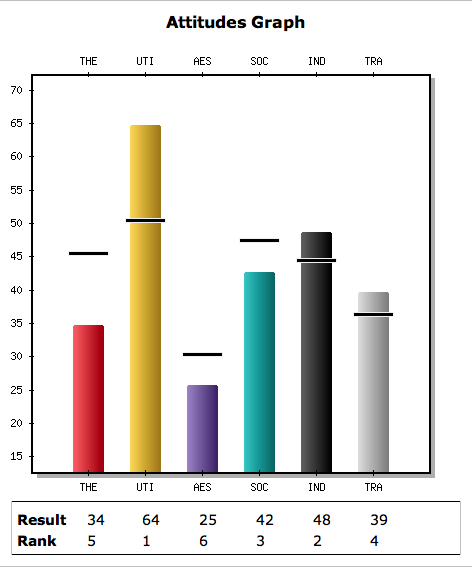Think about the best-performing salesperson you have ever worked with. Naturally you wish you had more salespeople "wired" just like this person. They MAY have been a "sales wolf".
Consider the worst-performing salesperson you have ever worked with. Clearly you want to avoid hiring others like this person. We call low-performers "sales vampires".
If you are new to my blog, allow me to share a couple of definitions...
- A "sales wolf" is that salesperson who performs in the top 25th percentile on a consistent basis. A sales wolf is wired to sell. By the way... If you want to know if you are a true sales wolf or one of your salespeople are - take the only multi-science sales personality test with validity backed by brain research to find out.
-
A "sales vampire" or "sales poser" is that person who likes to hope or believe they can run with your true sales wolves. By definition a "sales vampire" or "sales poser" cannot keep up with your sales wolves.
Motivators Help Predict Sales Performance
After assessing tens of thousands of sales professionals and comparing sales personality assessment results to past sales results, we have identified two critical motivators that are essential to top sales performance. If these two motivators are missing, it is unlikely they are an actual sales wolf.
The science of motivation is fascinating and powerful. I highly-recommend you learn as much as you can about it. Eduard Spranger, a German philosophyer and psychologist, contributed to personality theory by identifying "value attributes". The six "value attributes" or motivators every person has some combination of follow with a brief description:
-
Theoretical - The desire to seek knowledge, education, and intellectual growth.

-
Utilitarian - The desire to seek practical accomplishments and a return on time, energy, and money.
-
Aesthetic - The desire for balance, creative self-expression, beauty and nature.
-
Social - The desire to be of service or helpful to others.
-
Individualistic - The desire to seek personal recognition, freedom, and control over their own destiny and that of others.
-
Traditional - The desire to seek tradition through social structure, rules, regulations, and principles.
The Two Critical "Sales Wolf" Motivators - Utilitarian and Individualistic
Of the above six motivators, the two that are critical to "sales wolf performance" are the Utilitarian and the Individualistic.
I want to be crystal clear. The salesperson or sales candidate with a high Utilitarian / Individualistic combination - particularly those with both the Utilitarian and Individualistic both well above the national mean and equal, greatly-increases the likelihood they will be PROFOUNDLY MORE SUCCESSFUL than others who do not share this combination.
And if you want to kick it up a notch... Add the Theoretical to the motivators combination and you are much more likely to have pure magic (see the above motivators graph example).
"How do I interview for motivators?"
The question I am often asked is, "How do I interview for motivators?" My answer is straightforward - "Good luck."
It is very difficult to objectively and consistently identify motivators during the interview process.
How To Objectively Identify What Motivates a Salesperson
The best way to OBJECTIVELY identify the Utilitarian and Individualistic levels is to assess salespeople and candidates using the TriMetrix® HD sales personality assessment test. The TriMetrix® assessment instrument is very valid with validity backed by brain research. It is difficult if not practically impossible to effectively and consistently interview candidates to identify motivators.Following are a couple of important observations that will help you in hiring the best salespeople possible.
Watch the Utilitarian / Social Spread
The Social motivator can be too high. If the Social - the desire to be helpful and altruistic is higher than the Utilitarian - the desire to make money, the candidate or existing salesperson will not likely be a true sales wolf. This person will likely want to help others more than make money and that can be dangerous in sales.
Remember the fable, "Goldilocks And The Three Bears"? The Social motivator can actually be too low relative to the Utilitarian. If the Social is indifferent, there is the strong potential that the Client or Prospect may feel the salesperson does not care about them. This obviously can be dangerous.
Watch the Utilitarian / Individualistic Spread.
Entitlement thinking is a serious disease in every position - particularly sales. If you have a salesperson with a strong desire to make money (high Utilitarian) but lack the drive to make it happen through their own actions (low Individualistic), you are much more likely to have entitlement thinking.
Guessing Is For Losers
There are two things you must do right now.
- Learn about motivators. We have a powerful book you need to read.
- Complete a sample assessment to see what you are missing. If you are not using a multi-science sales personality test with validity backed by brain research to identify the unique Behaviors, Values/Motivators, Acumen, and Skills of Sales Wolves, you are guessing. And guessing is for losers.




